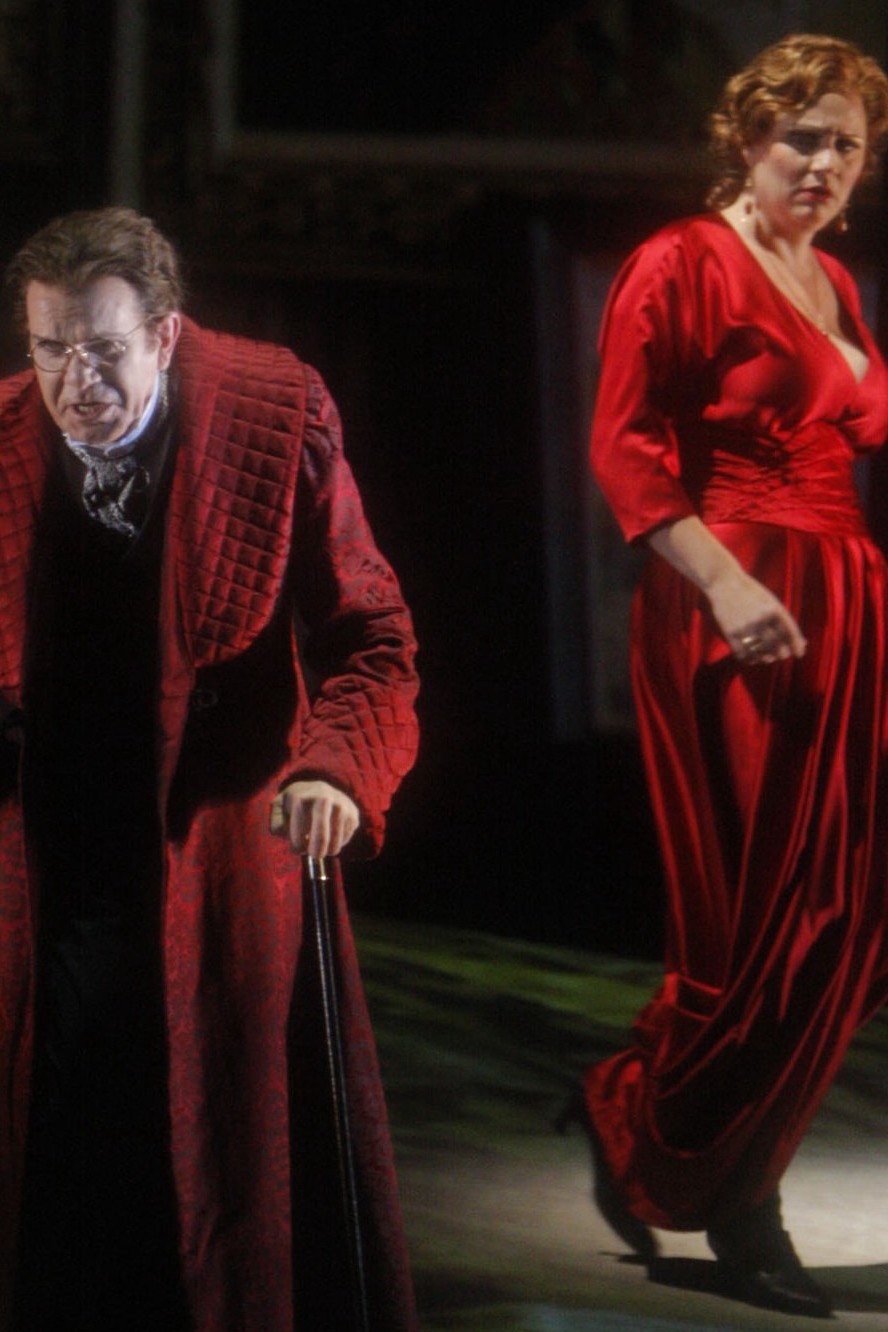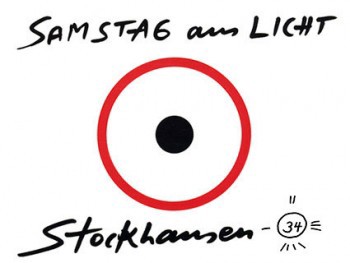Difficult Listening Hour: 'Die Gezeichneten,' Amoeba, 'Samstag aus Licht,' Broken Bells and 'De...
Difficult Listening Hour: ‘Die Gezeichneten,’ Amoeba, ‘Samstag aus Licht,’ Broken Bells and ‘De Staat’
by Seth Colter Walls

Mid-last week I found myself in the St. Vincent’s ER. After fighting and losing a series of digestive battles with an insistent bug that most of all wanted to keep me away from even drinking water for the better part of 24 hours, I’d stumbled in on the very night the institution’s imminent closing had been announced. Though I had not been an especially avid consumer of local news that day, I was soon made aware of the valedictory circumstances when a nurse hooked me up to some IV fluid and advised me to follow up later at another, less-doomed joint. A doctor asked me if there was “any cocaine in my system,” and I answered (truthfully) “no.” Then he asked my profession. After he heard “journalist,” he asked about the cocaine again, adding that since he might wind up administering a drug that “reacts wildly” to even trace amounts, that I’d really better let him know.
I wanted to bark out the first verse to “Out of Step,” but realized I wasn’t particularly feeling up to my usual music-referencing hijinks. I hoped to be back on my nerdery soon, too, because later in the week I was scheduled to fly to LA to catch up with two long-term friends, and also bring them along as my guests to a couple operas of note that are presently going down there. The more important event — the hemispheric premiere of a brillz 1918 joint called Die Gezeichneten (The Marked Ones, or, as it’s been translated in LA, The Stigmatized) — would be the first American staging of any opera by my Weimar-era boy, Franz Schreker. I’ve talked about him here before, as well as at my main gig, and needless to say, I was as amped for this rare event as I was distressed that I might miss it due to illness.
There’s not enough money for anything these days in New York, save for the pop items that we have a sometimes tendentious manner of justifying our affection for. We all know this. Not for hospitals, not for the extension of unemployment benefits, and certainly not enough to pay living wages for the editing and curating of certain websites. The fact that there’s not enough money to put on really gorgeous and intellectually engaged operas by composers who were unjustly banned and buried by the Nazis ranks a good ways down on this regrettable list, obviously, but that doesn’t mean it’s a deficit you can’t intuitively feel just the same, even if you don’t know why. Conscious that I was sitting in one such dead-Kapital-walking space in New York, my distress at the limits of social utility only sort of deepened. Still, I was hopeful that I could make it out to Los Angeles. And after I had managed to do just that a couple days later, and found myself sitting in the orchestra section for Saturday’s premiere of Gezeichneten, the grandly designed prelude of that piece washed over me like a miracle.
[wpaudio url=”http://tomscocca.com/Prelude%20edit%20Gezeichneten%201.mp3″ text=”Gezeichneten” dl=”0″]
These multiple, overlapping themes that seem suspended between the most orgasmic rapture and nerve-ending-rush kind of pain are basically something I’d really recommend you check out in full. [There’s a serviceable DVD of a recent Salzburg production out on EuroArts, though it suffers from a half-hour of dumb musical cuts. The full opera, from which the clip above comes, is available on this CD set.] Note, at around the 2:13 mark in the clip, how the pessimistic sound coming from the horn section is punctured with a heartening gurgle up from the woodwinds and then the strings. Neither side wins, necessarily, but in sequence, they achieve a moment of bitonal balance that maybe reminds you of the spectral school of composition — maybe late-period Magnus Lindberg in particular, if you’re a dork — except did I mention this was composed in 1918, motherfuckers? Then, at 2:24, the strings swell with ardor for a hot second before the horns get all stately and dour again. I could listen to a composer go back and forth like that all day, probably. Anja Kampe, for her part, was very sexy and in good voice for the Carlotta role (that’s her with Robert Brubaker in the image at the top of this post).
The libretto to Gezeichneten, also penned by Schreker, tells the story of a wealthy but deformed patron of the arts who constructs an island playpen for the noblemen of Renaissance-era Genoa. After the grotto becomes a hotbed of sexual depravity (natch), and sets local tongues to wagging, the humpbacked protagonist must decide whether to donate his refined island to the public at large — a prospect that annoys the libertine noblemen no end. The story contains romance, betrayal, a murder, political intrigue, an orgy and engagement with the question of what aesthetes owe each other-and the body politic. So basically it’s really excellent (if sometimes disturbing) theater. If you’re in LA you should go to this. And since opera folk tend not to be interested in things they don’t already know about, the tickets are relatively cheap, too (especially compared with LA’s uber-hyped Götterdämmerung, about which I was kinda “meh” when I saw it on Sunday).

Did I mention that there’s a lot of money in Los Angeles? I mean, I know they — and like, all of California — have their problems, too. But as I hiked up Runyon Canyon with a friend and looked at all of the people on parade — coming up and down the trails in workout clothes more expensive than my parents’ home — I marveled anyway, for sure. And while I’m suspicious about record stores that claim to have “everything” available, LA’s legendary record store, Amoeba, actually had most everything — including the home industry series of discs put out (at outrageous prices) by the family of Karlheinz Stockhausen. I’ve been wanting to get my grubby, modernist-loving hands on some of this stuff for years now, but haven’t really wanted to go back and forth with the money orders and ridiculous shipping markups through the family’s home base in Germany. I picked up Samstag aus Licht, the second opera in Stockhausen’s seven-opera cycle, a loopy and fantastical 29-hour jam composed after the seven days of the week. Samstag is “Lucifer’s day” in the cycle, which means it’s kind of a heavy-as-hell brand of Stockhausen, full of glissandos and densely packed harmonies that — sort of magically — results in a major seventh at the end of the prelude. Check out the rad, unexpected turn into more normal-sounding harmony at the 1:05 mark in this clip.
[wpaudio url=”http://tomscocca.com/Saturday%20greeting%20short%20edit.mp3″ text=”Samstag aus Licht” dl=”0″]
And then there’s the third scene, Lucifer’s Dance, in which a huge face is conjured by members of the symphonic band dispersed across the stage, before its constituent parts then begin to “dance.” Here’s an oddly jazzy clip from the “Upper Lip Dance,” for piccolo trumpet, other brass, and percussion.
[wpaudio url=”http://tomscocca.com/Lucifer%20dance%20jazz%20edit.mp3″ text=”Lucifer’s Dance” dl=”0″]
Don’t ask me how much I paid for this 4-CD set w/200-page booklet, full of photos and abstruse essays by Stockhausen. It was truly LA-obscene, but also very much worth it. After buying this, my friend and I had some bitchin’ suadero, brisket-style beef tacos at the Tacozone cart near Vons supermarket. I started to get ready to leave LA, but not before an evening visit to The Smell — that hallowed hall from which No Age sprang a couple years back. I didn’t read ahead of time who the bands were, because I just wanted to go anony-style, the way I used to duck into Portland’s X-Ray cafe when I was in middle school and saw Elliott Smith’s early punk band, Heatmiser. Nothing that amazing happened on Sunday night, though the second band on the $5 bill added an interesting sort of math-rock edge to the scene-defining No Age template, which was exciting. Also something I noticed: the kids who go to all-ages shows in LA have a lot more money for clothes than the kids in mid-90s PDX did. Telle est l’argent, I guess. Another LA highlight: the James Ensor painting Christ’s Entry into Brussels in 1889, which hangs at the Getty, and is just so satisfyingly pissed off that anyone who’s ever written anything online should be counted as a likely fan.
After my third night of couch-surfing in Echo Park, I boarded my JetBlue flight back to JFK. The cable news people on my miniature DirecTV screen were all pretty interested in things I decided I was not interested in, so I turned down the “brightness” all the way to black and listened to “The High Road” by Broken Bells on repeat for a while after pre-approved electronic devices were explicitly allowed again. That moment — and it’s a familiar one to you if you’re familiar with the best James Mercer songs — where the singer shifts from his stoic, lower register to his wounded-but-soaring higher one always leaves me pretty satisfied with the world as it is, imperfections and all.
Besides, I thought on the flight home, New York may seem like it’s crumbling, but it still has some great things to offer, including this weekend’s festival of Louis Andriessen-related happenings. Tonight brings the local premiere of the post-minimalist’s operatic take on Dante’s “Divine Comedy.” You can listen to a clip of La Commedia and buy tickets (as low as $25) here, but this is really the sound of Andriessen’s I want to leave you with. It’s just a minute from his insanely driving piece De Staat, which, if you grew up listening to grindcore on Earache records like I did, you might dig:
[wpaudio url=”http://tomscocca.com/De%20Staat%20edit.mp3″ text=”De Staat” dl=”0″]
Happily, this piece is not at all expensive at all to acquire. (The half-hour joint costs all of one credit at eMusic, for example.)
And so what I guess I’m saying, doctor, is who needs cocaine if you’ve got all this?
Previously: William Kentridge To Direct Shostakovich, Redeem Winter in NYC
Seth Colter Walls goes to a lot of concerts, and is even eating things again.
